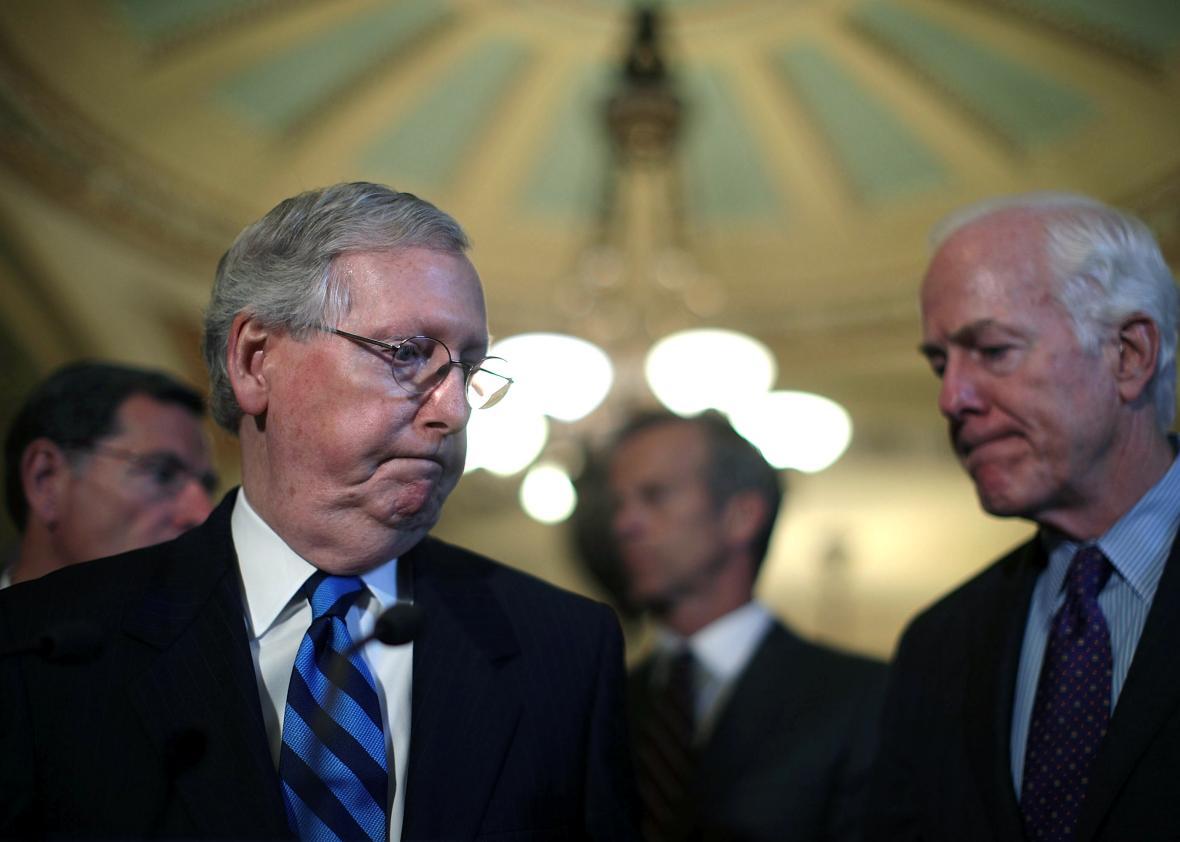The Senate is prepared to release its “new” health care bill on Thursday morning. It will look a lot like the “old” health care bill, just with a few changes that at first glance wouldn’t appear to flip that many crucial votes to yes. Big day! Big… day.
Here’s what we can expect.
The “new” bill offer $45 billion to combat the opioid epidemic, a sizable increase from the $2 billion allotted in the original bill that didn’t nearly meet Ohio Sen. Rob Portman’s and West Virginia Sen. Shelley Moore Capito’s demands. The “new” bill is also expected to add a provision allowing people to use health savings accounts to cover premium payments.
The Better Care Reconciliation Act 2.0 will likely keep three Obamacare taxes that the original bill repealed: the 3.8 percent tax on net investment income for high earners, the 0.9 percent Medicare surtax (which the House health care bill kept in place for six years), and the so-called “insurance executive tax break.” This is the starkest expected change in the bill, and we’ll have to wait on the Congressional Budget Office to assess whether it meaningfully improves the bill’s coverage forecasts. At the very least, it mitigates the horrendous political problems associated with reducing coverage while giving tax breaks to millionaires. While some senators aren’t pleased that these taxes are staying—“I think that’s very unfortunate,” Pennsylvania Sen. Pat Toomey said Wednesday—it’s not a deal-breaker for any of them.
Then there’s the amendment put forth by Texas Sen. Ted Cruz that’s the key to his and Utah Sen. Mike Lee’s votes. This is the one that would allow insurers to sell plans that don’t comply with Obamacare’s individual market regulations so long as they also sell at least one that does in the same state. The CBO is analyzing two versions of the new bill: one with the Cruz amendment, and one without it. The score of the one with the amendment will likely be a bludgeoning, as just about every expert predicts it will send premiums for the Obamacare-compliant plans, which those with pre-existing conditions need, spiraling out of control. Senators are still working on adjustments to the Cruz amendment that could—could! theoretically!—defang its worst effects, as I wrote about yesterday. But those won’t appear in the bill that’s released tomorrow. (The Cruz amendment would also have to pass muster with the Senate parliamentarian. As it happens, I saw the estimable Elizabeth MacDonough in the hall on Wednesday and attempted to gossip with her about this very issue. It was not fruitful.)
The bill may also include some of those sweet, sweet buyoffs. “A small tweak is likely to be added that would benefit Louisiana,” Axios reported this week. “This would help with Sen. Bill Cassidy’s concerns.”
And that’s about it in terms of what we know.
So. Do you notice a certain vast policy area that is not subject to any changes in this hot “new” bill? The area that is the major source of concern to a handful or so of votes? That’s right: the “new” bill, as it pertains to Medicaid, which affects the most number of people in this bill’s purview, is expected to stay the same. The bill will still phase out Obamacare’s Medicaid expansion over a few years, and then introduce a slow-growing cap on spending for traditional Medicaid.
It remains difficult to see how necessary votes like Nevada Sen. Dean Heller, Alaska Sen. Lisa Murkowski, Portman, and Capito—to name a few—could vote for this “new” bill when it is the same as the “old” bill on the major entitlement reform at its center.
Toomey, the Senate’s staunchest defender of the bill’s Medicaid reforms, had some fighting words on Wednesday for any senators who have a problem with this. After saying that the country would face a financial crisis without this entitlement reform, Toomey told reporters that those who aren’t willing to accept the slow growth rates “just need to admit that you want to have the crisis. You’re just waiting for the crisis to occur, and you’re gonna, I guess, hope for the best or blame someone else.” It is unclear if Toomey suggesting that fellow Republicans senators want to have a financial crisis is a constructive means of persuading them to his position.
The discussions will still be fluid even after the “new” bill is released. Leaders are telling concerned Republican senators that they can try to change the bill during the open amendment process that follows the first procedural vote, expected next week. “I think it would be safe to assume that a fully amendable bill, after the motion to proceed,” Missouri Sen. Roy Blunt said, “should give everyone a sense that they’ll have an opportunity to make whatever point they want to make.”
That may be the political question that determines whether this thing gets passed: Will senators be content with making “whatever point they want to make” during the amendment process—i.e., just getting a show vote on their pet issue? Or will they expect their amendments to pass?
